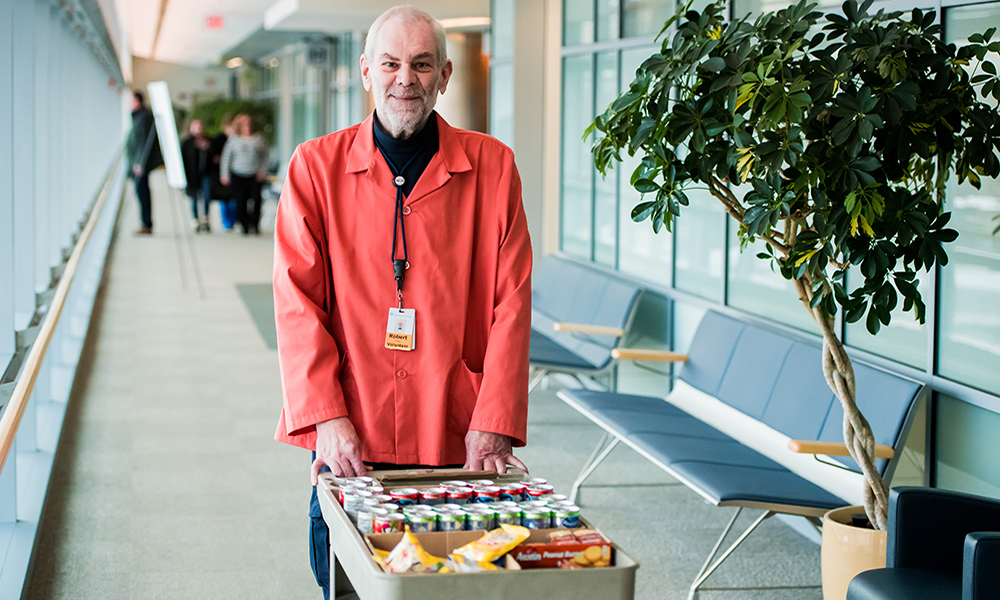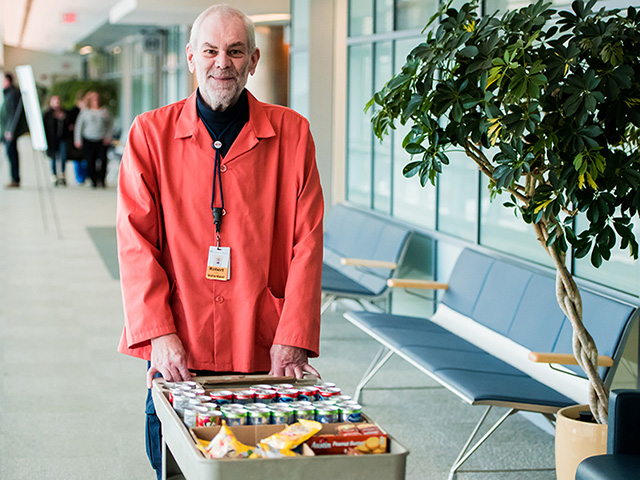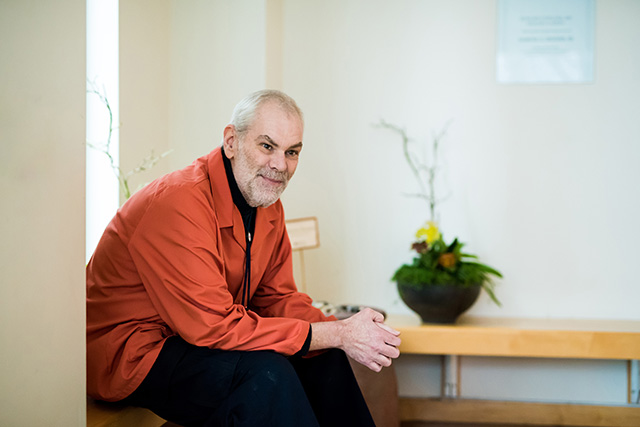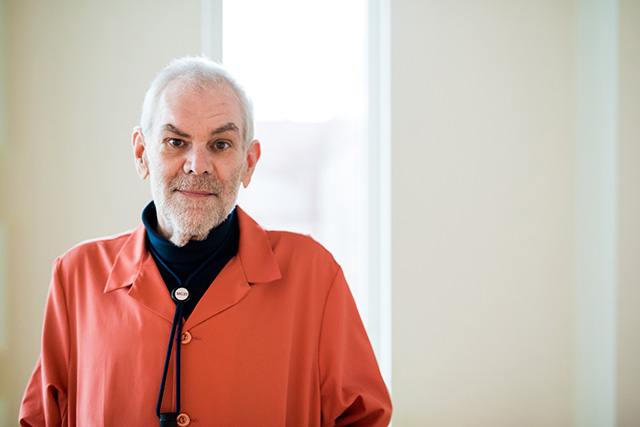Patient StoryJul | 13 | 2017
Bob O'Mara


The Cancer Center’s Story Project is an effort to capture stories from our community of patients, friends, family, clinicians, and staff who have been affected by cancer in some way. This is Bob's Story.
- Bob O’Mara is both a current patient and volunteer at the Cancer Center. When applying to volunteer, he knew exactly what he wanted to do: "Snack cart guy". He wanted to be the person and friendly face to take the worry away for a few minutes by providing free snacks to patients.
- "I decided it was time to do something, so I decided I wanted to be a volunteer…I’m the snack dude."

“I was diagnosed with esophageal cancer on April 13, 2012. It was my birthday. I was 61 that day, and it was also opening day of the Red Sox, which I had tickets for.”
Did you go to the game?
“Yup. I got the diagnosis at 9 o’clock in the morning and opening day started around 1 o’clock. My wife was with me at the doctor. It kind of came as a complete shock. I mean, I was having trouble getting food into my stomach. No pain or anything, but food was getting backed up occasionally. So I ended up seeing a gastrointestinal doctor and he did an endoscopy. He said ‘well, come meet me in my office in a week and we’ll go over the results.’ I didn’t know what they were going to say but I didn’t think they were going to tell me I had cancer. So he said at that point, ‘you’re all done with me there’s nothing I can do for you. I don’t treat cancer patients.’ And he suggested I call any of the major hospitals here in Boston, tell them what’s going on, and make an appointment to start. My wife and I left and got back in the car and decided...well, we live in Melrose on the North Shore and Mass General is a great hospital. It’s a little easier to get to than going across town to the others. So we decided on Mass General. We decided to do that and my adult children at the time knew I was going for the results that day. My wife said, ‘well, are we still going to opening day?’ and I said yeah. All my staff at work also knew I was going to get the results that day. I said ‘yes’ because if we don’t go and take pictures and send pictures, then they’re going to know something’s wrong and I didn’t want them to know that way. So let’s just go and come home then we can deal with breaking the news to people. So that’s what we did.”
Can you describe your experience here at the Cancer Center?
“It was Friday the 13th actually and we had our first appointment the following Tuesday at Mass General. They assembled a team of 3 doctors and a couple of nurse practitioners. We had a long meeting and they told me what they recommend of the course of treatment. I said, ‘let’s do it.’ I affectionately named us all Team Bob and I had Dr. Kwak, she was kind of the head of the team and she was in charge of chemotherapy. And Dr. Hong, he was in charge of the radiation treatment I had. At that time, my surgical oncologist was Dr. Sam Yoon and he was my surgeon and the course of treatment was going to be daily radiation treatment and weekly chemotherapy. We were going to that for 5 or 6 weeks and then after that was done, we had to wait about a month. Dr. Sam was going to cut me open and remove the tumor that was on my esophagus. He did that in July of 2012.”

“It started April 13th and the mid-July surgery was done. That was pretty much most of the treatment. I never had to go back for radiation or chemo. I did have two more surgeries that were results of the original cancer surgery. They weren’t cancer related but when they put me back together in that June after they cut me open I had problems with bowel obstruction because of the feeding tube that they put in me and then later on I had my diaphragm split open from where the original surgery was and they fixed that. So since 2012, I’ve had 3 surgeries. Dr. Mullen became my surgical oncologist after Dr. Sam moved to New York, but Dr. Kwak and Dr. Hong stayed with me and still are my doctors but I never had to go back for any chemo or radiation. A couple of times I had to go for infusion for Iron. My Iron was low so they wanted me to do that. I was on average, about every 6 months to a year, we would do a full body CAT scan and see what’s going on inside of me, looking for cancer. I’m having that next week. At this time, it’s my 4 and a half year mark. I had one scan 6 months ago and they found a couple spots on my lung but they aren’t concerned about it. They said they aren’t concerned about it because if they show up they would really have to pay attention. So I’m going back for my CAT scan next week. Then a week after that I meet with them and get the results of the scan and I don’t know what will happen. If the CAT scan is clear...Team Bob has always told me 5 years. They wanted to see me alive for 5 years. And once I get to 5 years, I’m a survivor, and I’ve made it. You know, I don’t know what they would do, maybe see me once a year. But basically after 5 years of being clean...not that I’m done, I’m not done, I’ll find out when they see me again but they always talked about the 5-year mark.”
The 5-year mark is getting close!
“I know, it’s getting close.”
What have you learned about yourself since being diagnosed?
“I don’t know that I’ve learned much about myself new. I’ve always known a lot about myself over the years. I think I reinforced my belief that I’m a pretty practical person. I’ve always had the belief to hope for the best and prepare for the worst. And you know, the first year of being diagnosed changed my life. I became a member of an exclusive club that’s not so exclusive anymore. When I say “practical” it’s because I remember to this day, not as much as that first year, waking up every morning thinking about dying, preparing for God. But I accepted it. I never said 'why me' or 'why is this happening to me? or 'this shouldn’t be happening to me.' I never thought that at all. My basic emotion for the last four and a half years, it’s dissipating a little bit...it was pretty tough the first year...it was anger. I was angry. I was pissed off. This sucks. I wasn’t happy. And I’m still not happy. The changes in my body that I’ve gone though. You know, the constant worrying or thinking about it. For the last month I’ve been thinking about January 31 when I meet with Team Bob again. Are they going to tell me good or bad? It’s been good all along so hopefully we’re arriving at a streak. But you know, there’s anger. I’m angry that I have to be preoccupied all the time. It’s dissipating over the years. The first couple of years I thought about it every day, planning my funeral. What songs I’d like to have at my memorial service. Very practically that first month I did a lot of business work. I’m married and my wife and I just had our anniversary of 36 years. I’ve always done the finances and all of that so I got everything in order. I wrote everything down and made sure she knew where everything was and what the passwords were. What money was in which account and what bills get paid automatically and which ones she has to pay. I condensed the bank accounts to make it less confusing for her. I just got all my affairs in order in case I wasn’t going to be there and make it a little easier for her.”
“I have a graduate degree in social work from Boston University. I’ve been a social worker all my life. I contacted them and I enrolled to donate my body to Boston University medical school, so when I die either this year or 10-15 years from now, my body goes to BU and they do what they want with it. It’s very interesting how it’s set up. I’m also an organ donor and it’s kind of a jumble because I think BU won’t take me if somebody else takes my organs first. So my first choice is to go to BU, but if BU doesn’t want me for some reason then I’ll donate my organs. Who knows? My family can figure that part out. But yeah, I did some really practical things to get my affairs in order. I got everything arranged. I did everything I could to prepare, practical things in case I die. Emotionally, I did OK.”
What has been the hardest part of being diagnosed?

“The hardest part of the whole thing was telling my children. That day: April 13, 2012. I was trying to figure out what to tell my kids. All of them are adults. Molly in 2012, she was 30 years old. My son Daniel was 26. My wife was there when I got the diagnosis and was with me every step of the way. She was fabulous. A lot of these things wouldn’t have worked if she wasn’t there. She came to all the appointments. She was the main support for four and a half years. Her name is Martha. But telling Molly and Daniel...that was the most difficult thing I had to do. It took me a couple of days to figure it out. Neither of them live around here and I lied to them… I didn’t lie, I fibbed. I said, ‘oh yeah, it went well he did this and that.’ It was true, the doctor originally called it an ulcer on my esophagus. So I told them they found this little ulcer on my esophagus and they want me to see somebody at Mass General and they’ll probably give me some pills or something to get rid of it and they’ll probably tell me I can’t eat pizza anymore or spicy foods. No big deal. Then I said ‘yeah, so the doctor found a little bit of cancer or something down there too but he wasn’t too concerned about it and I’ll figure it all out at Mass General.’ So that’s what I told them. Whereas the doctor told me I had cancer, a malignant tumor on my esophagus that needed treatment immediately, I didn’t want to tell the kids that. I thought eventually they would figure things out. I told them that mum and I were going to Mass General on Tuesday and I would keep them posted. I said ‘yeah, they want me to do a little radiation for a couple of weeks and a little chemotherapy and you know, they’re not too concerned about anything.’ They’re smart kids, they knew what was going on. Just telling them, that was hard. I felt bad for them. We’re close. I was pissed that they had to go through this. It was difficult. That was it. I have to say Dr. Kwak and Dr. Hong saved my life. I’ve been seeing them for four and a half years. I see them all the time when I volunteer. They chuckle at me when they see me volunteering. Dr. Kwak just left. She left on Halloween. She grabbed me in the hall one day to tell me she was leaving. I felt bad and I said, ‘thanks for keeping me alive for four and a half years. You saved my life.’ Everybody that worked with me was fabulous and we became like one big family. So that’s my story medically.”
What made you decide to become a volunteer?
“As a volunteer, I’ve been doing this now for two years. Anyway, I was a social worker for 30 years and once I was diagnosed in 2012 after the chemo and radiation and surgery I went back to work. Within a month I just couldn’t do it. I couldn’t do it so I had to retire. Which is okay. So for a year or two I just got treated here and got busy here. Back then I was here once a month or once every two or three months. I was here a lot. At some point about 2 and a half years ago, I decided that I probably wasn’t going to feel a whole lot better than I was then, and I was feeling okay. It wasn’t like I was before all of this, but I was living okay. I thought I wasn’t going to feel much better than I did before so I thought it was time to get off my ass and do something. So I ended up contacting the oncology department and I went through the training and became a volunteer.”
“I decided it was time to do something so I decided I wanted to be a volunteer. I checked with Team Bob first and they thought it was a great idea so I went through the training and all of that. I live in Melrose and I also volunteer at Hallmark Health. I don’t do a whole lot there, it’s very specialized. I’m a hospice volunteer. That’s two fold. One: When a patient gets assigned to hospice, I go up and visit once a week and hang out with them. There’s not a lot of patients so I can go a couple of months without getting a patient and then they’ll call me. Sometimes I see them every week for a month and then they die. I like spending time with them and helping them out. I chose specifically Hallmark because a lot of hospice care is in-home. I didn’t want to do the in-home hospice. So all of these patients are in hospitals, nursing homes, and assisted living and all that. So I’ve had 3 to 5 patients in hospice over the past year. I’m also on the vigil team with Hallmark and that is when a hospice patient ends up in the hospital and they pretty much have 48 hours to live. So they don’t die alone they like to get somebody in the room all the time. Overnight. They’ll call me and ask if I could go over for a few hours and I’ll spend from midnight to 3am with them talking and reading. The three or four times I’ve done it the patients are pretty much unconscious. I don’t know what they hear. I want to do that because nobody should ever die alone. Somebody should be right there when you die. If I can be that person, then I will.”
“So here I am, on Tuesdays and Wednesdays I come in for the afternoon shift. I’m the snack dude. Now, an interesting little piece to that was when I had my interview with Kimberly as to what I would like to do, she asked me ‘do you have any idea what you want to do?’ and I said ‘I know exactly what I want to do, I want to do the snack cart in the Cancer Center.' So she chuckled at me and said, ‘wow, that’s really specific. Why?’ I can’t tell you the number of times I sat in the waiting room on Yawkey 7. And you would sit there and get your blood drawn and wait to get called. And you know, you would look around the waiting room and we all seemed to have faces of sadness and fright. We were scared. Desperate. We all knew they were going to call our name and we were going to go behind that door and we were going to hear something. It might be great news. It might be terrible news. We’re cancer patients. But when we were sitting there, there were all these faces that seemed to be scared and desperate. Nervous. And the snack cart would come in the room and people, including myself, for a brief moment would stop thinking about going behind that door. There was free food! Peanuts and juice and cookies. For a brief second, you forgot about going behind that door. I certainly did. I told Kimberly that was what I wanted to do because I know there’s a respite at least for a couple minutes. Everybody likes free food, everybody likes to get fed, and that’s what I wanted to do. So that’s what I did.”
Bob O'MaraI decided it was time to do something, so I decided I wanted to be a volunteer…I’m the snack dude.
This interview took place on January 18, 2017, and has been edited for clarity.
Related Programs
Type
Centers and Departments
Topics
Patient Stories
View inspiring cancer survivor stories from Mass General Cancer Center’s community of patients, families, and staff.
participated in Clinical Trials at the Mass General Cancer Center last year
This helped lead to new knowledge and breakthrough therapies.
